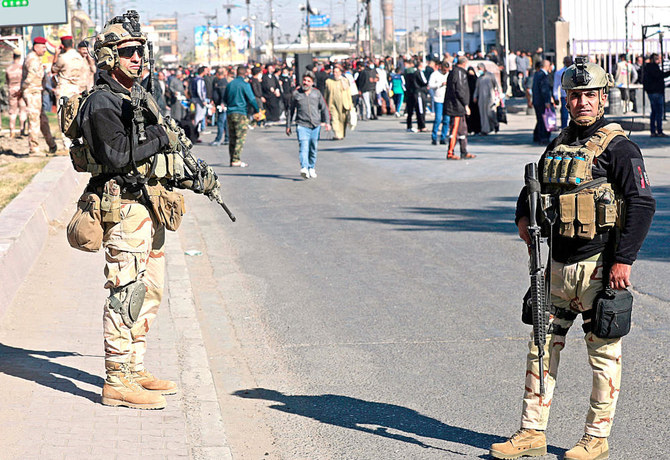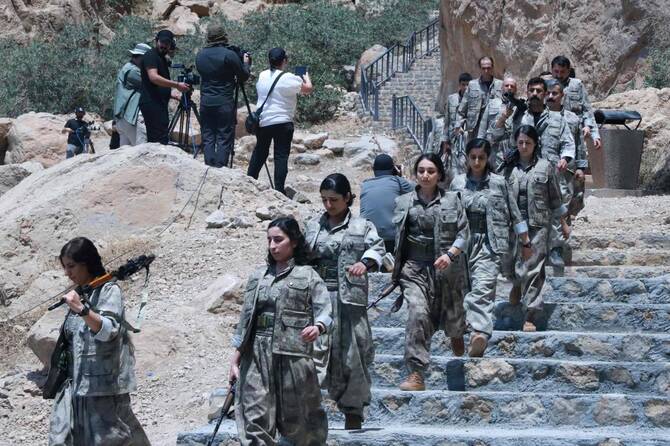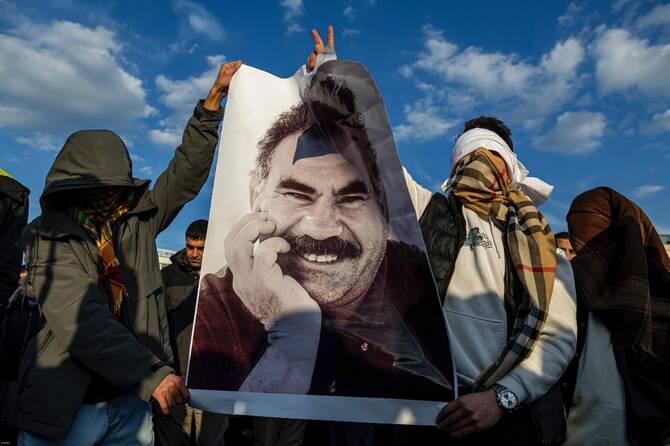SULAIMANIYA: An attack by Daesh militants on a village in northern Iraq on Friday killed three villagers and 10 Kurdish soldiers, officials in Iraq’s autonomous Kurdish region said.
Daesh claimed responsibility for the deadly attack in a statement posted on an affiliated Telegram account.
The attack took place in the Makhmour region, a hotbed for Daesh activity that sees regular attacks against Kurdish forces, Iraqi forces and often civilians.
Makhmour is a mountainous area about 70 km southeast of Mosul and 60 km southwest of the Kurdish capital of Irbil.
Kurdistan’s Prime Minister Masrour Barzani called for greater security cooperation between Iraqi Kurdish and Iraqi security forces to stop Daesh’s insurgent activities.
Iraqi officials and analysts have long blamed a lack of coordination along a stretch of territory claimed by both Baghdad and Irbil for Daesh’s continued ability to wage deadly attacks.
Daesh controlled roughly a third of Iraq between 2014 and 2017, including the remote Makhmour region but also major cities including Mosul.
A loose coalition of US-led forces, Iraqi and Kurdish troops and Iran-backed Shiite militias defeated the extremist group in 2017, but its members still roam areas of northern Iraq and northeastern Syria.
Western military officials say at least 10,000 Daesh fighters remain in Iraq and Syria.
A statement from the Kurdistan region’s armed forces, the peshmerga, said Daesh militants attacked the village in the early hours of Friday killing three residents.
It said peshmerga forces intervened, resulting in clashes that killed at least seven of their soldiers.
Kurdish security and hospital officials said the final death toll was at least 10 peshmerga soldiers and three villagers.
In a separate development, Kurdish demonstrators in The Hague stormed the headquarters of the global chemical weapons body on Friday, sparking clashes in which six people were hurt and 50 arrested, Dutch police said.
Dozens of protesters alleging that Turkey is using toxic arms in northern Iraq broke through security to enter the grounds of the Organization for the Prohibition of Chemical Weapons in The Hague.
A number of them managed to get inside the lobby of the building before police removed them, diplomatic sources said, while the rest staged a noisy protest outside the front doors.
Police dragged the demonstrators off one by one, put them on the ground and handcuffed them, journalists saw. Some were bundled into waiting vans, but the large number meant many were taken away in a hired bus.
At least a dozen police vehicles sealed off the road outside the OPCW, which is opposite Dutch Prime Minister Mark Rutte’s official residence. Several ambulances and a medical helicopter were also at the scene.
Two police officers and four protesters were wounded when the demonstrators “stormed the building,” The Hague police said.
Turkish jets regularly attack the separatists’ bases in northern Iraq and autonomous Iraqi Kurdistan, with several villages having emptied of their inhabitants since a new Turkish army offensive in April.
The PKK and Kurdish organizations in Europe have in recent months accused Turkey of using chemical weapons, including a nerve agent and sulfur mustard gas, in dozens of attacks in northern Iraq.
“We have called on OPCW and all international bodies to come and independently investigate the use of chemical weapons,” Zagros Hiwa, a spokesperson for the Kurdistan Democratic Communities Union, the PKK’s political branch, told AFP.






















